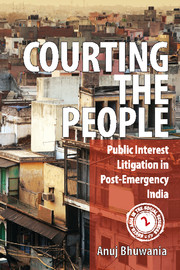Book contents
- Frontmatter
- Contents
- Acknowledgements
- Introduction
- 1 Competing Populisms: Revisiting the Origins of Public Interest Litigation in India
- 2 The Case that Felled a City: A PIL with Nine Lives
- 3 Public Interest Litigation as a Slum Demolition Machine
- 4 Good Judges, Bad Judges: Critical Discourses on Public Interest Litigation in India
- Conclusion: The Procedural is Political
- Bibliography
- Index
4 - Good Judges, Bad Judges: Critical Discourses on Public Interest Litigation in India
Published online by Cambridge University Press: 23 July 2017
- Frontmatter
- Contents
- Acknowledgements
- Introduction
- 1 Competing Populisms: Revisiting the Origins of Public Interest Litigation in India
- 2 The Case that Felled a City: A PIL with Nine Lives
- 3 Public Interest Litigation as a Slum Demolition Machine
- 4 Good Judges, Bad Judges: Critical Discourses on Public Interest Litigation in India
- Conclusion: The Procedural is Political
- Bibliography
- Index
Summary
The average intelligent Indian thinks of PIL as the modern equivalent of the bell which the better kind of king is reputed to have strung outside his palace for the desperate citizen to tug at and get an instant hearing and instant justice. The average intelligent Indian also thinks that all the limitations of judicial power that he or she is otherwise familiar with will vanish when the Courts sit to hear PILs, namely that they become benign despots who can set every wrong right by passing a condign order.
–K. BalagopalThe Supreme Court, in a 2010 judgment, provided its own history of PIL, broadly dividing public interest litigation in India into three phases.
Phase-I: It deals with cases of this Court where directions and orders were passed primarily to protect fundamental rights under Article 21 of the marginalized groups and sections of the society who because of extreme poverty, illiteracy and ignorance cannot approach this court or the High Courts.
Phase-II: It deals with the cases relating to protection, preservation of ecology, environment, forests, marine life, wildlife, mountains, rivers, historical monuments, etc.etc.
Phase-III: It deals with the directions issued by the Courts in maintaining the probity, transparency and integrity in governance.
From ‘poverty’ to ‘environment’ to ‘governance’: this is the trajectory of PIL that the Indian Supreme Court itself confesses to. Sudipta Kaviraj has written as to how the decline of institutional spaces with Mrs Gandhi's more personalized politics made possible a new irresponsibility of ideology with baffling shifts of emphasis, the most spectacular of these being that ‘fertility and not poverty became the major obstacle to Indian development’ during the Emergency. PIL, too, with its lack of institutional grounding and close identification with specific judges, has been prone to these sorts of wild fluctuations in ideology. The most celebrated of these has been the change of focus from poverty in its first phase in the early 1980s to ‘bourgeois environmentalism’ from the mid-1990s. It is the inherent instability of populism in both instances that allowed such a fundamental shift in priorities to take place.
This change in priorities in PIL cases has not gone unlamented. There has been a significant literature criticizing it, especially the dislodging of the poor from the position of PIL's foremost discursive constituency.
- Type
- Chapter
- Information
- Courting the PeoplePublic Interest Litigation in Post-Emergency India, pp. 112 - 133Publisher: Cambridge University PressPrint publication year: 2016



